Publications
When there are new challenges to rise up to, KAIST CAF will be at the very forefront.
Publications
Total : 15
-
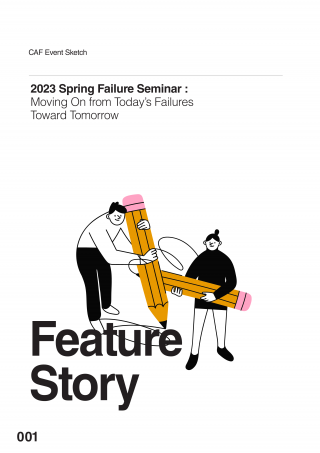 CAF Insight2023 Spring Failure Seminar : Moving On from Today’s Failures Toward Tomorrow
CAF Insight2023 Spring Failure Seminar : Moving On from Today’s Failures Toward Tomorrow2023-06-15
KAIST CAF
The third Failure Seminar was held on April 26th at the Yang Seungtaik Auditorium. The ‘Failure Seminar’ is a talk series hosted by the Center for Ambitious Failure (CAF) that invites leaders and pioneers from diverse fields to share their failure stories and perspectives with KAISTians, encouraging them to take on new challenges. The theme of the third Failure Seminar was “how to deal with everyday failures.” CAF invited Emeritus Professor Soonhung Han from KAIST, CEO of OGQ Chul-ho Shin, and Toss Content Manager Kyunghwa Jeong to share their insights with the audience. Professor Soonhung Han gave a talk titled ‘How to appreciate small failures’ with the hope that students can overcome their fear of failure and become more accustomed to small failures in their lives. Professor Han’s advice to KAIST students was to go out and experience small failures firsthand, even intentionally if necessary. According to Professor Han, this process cultivates the mental strength necessary to overcome failures, enhancing one’s capacity to deal with setbacks. KAIST alumnus and founder of OGQ (a content creator platform) Chul-ho Shin described his belief that the only person who can define the magnitude of an individual’s failures as well as their own personal threshold is the individual themselves. Recounting his story, he conveyed a message of hope: even if you repeatedly fail, as long as you are doing what you believe in with perseverance, luck and opportunity will find you one day. Kyunghwa Jeong, who is a Content Manager at Toss, is known for writing the book ‘An Out-Of-The-Ordinary Challenge,’ which chronicles the growth period of the now-famous Korean startup. As she described various episodes of the Toss team’s struggles, Jeong focused on the transformative impact of failure on both individual team members and the organization as a whole. Describing each episode with vivid detail, Jeong emphasized how each failure did not simply signify the end for the Toss team. She also discussed the attitudes that individuals and organizations need to adopt to leverage failure experiences as catalysts for change and growth. All three speakers spoke about the perspective with which we should view everyday failures and the importance of doing so. This article provides an overview of the insights shared by the three speakers (each representing different generations, fields, and experiences) regarding how we should view our failures of today within the broader context of life and what we need to do to persevere onward despite setbacks.
Origin
Download -
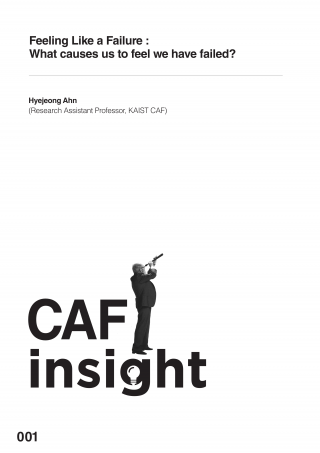 CAF InsightFeeling Like a Failure : What causes us to feel we have failed?
CAF InsightFeeling Like a Failure : What causes us to feel we have failed?2023-06-01
Ahn Hyejeong / Research Assistant Professor, KAIST CAF
The dictionary definition of the word ‘failing’ is ‘being unable to achieve what one intends or being unable to complete one’s goals or plans.’ Upon closer inspection of this definition, we can see that failures are instances that only occur when we intend to do something, set goals, or make some sort of attempt. However, when people, especially young Koreans, accumulate ‘failures’ throughout their journey, they often focus more on the emotion of ‘feeling like a failure’ more than the actual experience of failing to pursue or achieve a goal.
Origin
Download -
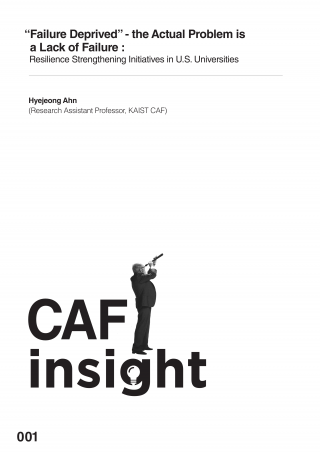 CAF Insight“Failure Deprived” : Resilience Strengthening Initiatives in U.S. Universities
CAF Insight“Failure Deprived” : Resilience Strengthening Initiatives in U.S. Universities2023-04-05
Ahn Hyejeong / Research Assistant Professor, KAIST CAF
“Failure Deprived” - the Actual Problem is a Lack of Failure : Resilience Strengthening Initiatives in U.S. Universities Universities that are focusing on resilience Given the current situation, several U.S. universities have begun to recognize that they need to intervene in this matter. The first school to make a move was Cornell University. The university, where several student suicide incidents took place in 2010, declared that “it is an obligation of the university to help students learn life skills.” Stanford, Harvard, Princeton, and the University of Pennsylvania soon followed by launching initiatives to develop the resilience of their members. Faced with the reality that many of their brightest students, most of whom grew up under competitiveness environments, were unfamiliar with the natural process of learning from failure, a consensus started to form around the idea that universities needed to fill this void. These programs all aim to help students understand that failure is natural and common while also providing support so that students can learn from their failures and setbacks. Moreover, the programs help members build up their resilience to failure and stress by instilling new perspectives regarding failure and by utilizing a variety of university resources.
Origin
Download -
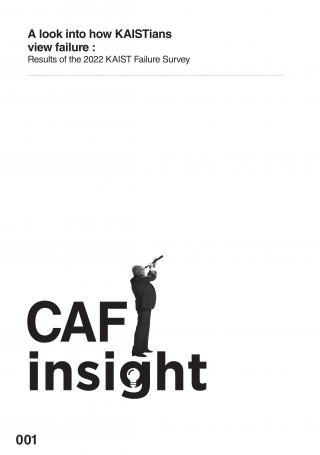 CAF InsightA look into how KAISTians view failure : Results of the 2022 KAIST Failure Survey
CAF InsightA look into how KAISTians view failure : Results of the 2022 KAIST Failure Survey2023-03-29
Ahn Hyejeong / Research Assistant Professor, KAIST CAF
The Center for Ambitious Failure (CAF) held a survey in December to get a better picture of how KAISTians view failure. The <KAIST Failure Survey> included questions that asked KAISTians how they would describe their ① fear of failure and their ② psychological capital, which is a measure of one’s psychological capacity to appropriately respond to failure and face challenges. Moreover, the survey attempted gauge qualities such as ③ psychological safety and ④ failure learning behavior, which serve as indicators describing the culture within KAIST of accepting the failures of its members and learning from failure. CAF plans to conduct the survey annually to investigate how these indicators change year by year. The gathered data will be used to assess the effectiveness of efforts aimed at improving the perception of failure in KAIST and building a better campus failure culture. The first survey was held as an online survey over two weeks from December 27th, 2022 to January 9th, 2023. We received responses from over 700 KAISTians over this period. Among them, a total of 609 responses were included for the final analysis, including responses from 152 undergraduate students (25%), 295 graduate students (48.4%), 40 faculty members (6.6%), and 122 staff members (20%). This month’s newsletter presents a summary of the survey results.
Origin
Download -
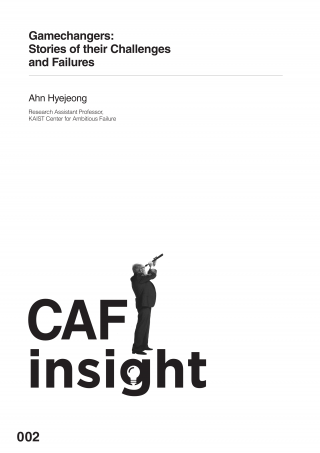 CAF InsightGamechangers: Stories of their Challenges and Failures
CAF InsightGamechangers: Stories of their Challenges and Failures2023-01-27
Ahn Hyejeong / Research Assistant Professor, KAIST CAF
The early years of SpaceX told through 『Liftoff』 and the 10-year journey of Toss archived in 『An Out-Of-The-Ordinary Challenge』 In 2022, two long-awaited books were released in Korea: one detailing the remarkable journey of how SpaceX transformed the aerospace industry and became the world’s leading private space company, and the other retelling the story of the Toss team, Korea’s first fintech unicorn company that is revolutionizing financial experiences for consumers. These books describe how both companies had to constantly prove themselves while enduring the many obstacles, failures, and struggles that came with taking the unknown road – the road that was deemed by everyone as impossible.
Origin
Download -
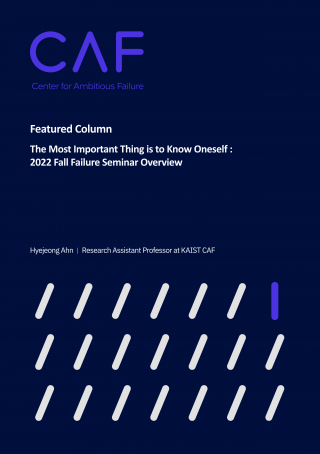 CAF InsightThe Most Important Thing is to Know Oneself : 2022 Fall Failure Seminar Overview
CAF InsightThe Most Important Thing is to Know Oneself : 2022 Fall Failure Seminar Overview2022-12-15
Hyejeong Ahn ┃ Research Assistant Professor at KAIST CAF
The second CAF Failure Seminar was held on November 3rd. The 'Failure Seminar' is a talk series hosted by CAF where leaders from various fields are invited to share their failure experiences and unique perspectives on failure, encouraging the audience to take on new challenges. Unlike the first seminar, which was held as an online event in spring, the second Failure Seminar was an in-person event held at the KAIST Yang Seungtaik Auditorium, bringing the speakers and audience even closer together. The morning session, which was centered around the theme of ‘Failure Studies for Entrepreneurs,’ featured talks by Lee Yongkwan from Bluepoint Partners and Lee Jinyeol from the Korea Senior Lab. Lee Yongkwan, who has experience investing in over 260 companies, emphasized the need for entrepreneurs to develop their metacognition skills, which allows them to maintain objective situation awareness. Lee supported his points by describing his own experiences. Lee Jinyeol gave a vivid recount of the lessons he had learned from his initial failure as an entrepreneur, which he credits as the reason why he is able to successfully lead his current venture in the Korea Senior Lab. His message to entrepreneurs is to strive to become not the ‘No. 1,’ but rather the ‘Only 1.’ In the afternoon session that followed, Professor Kim So Young from the KAIST Graduate School of Science and Technology Policy and Yun Yuh Soon (the first woman to be given a leadership role in LG and the current CEO of LG Art Center) shared unique and diverse perspectives on the fear of failure. Professor Kim started her speech with “failure is indeed something we should be afraid of.” She presented the audience with various cases from sports, startups, and research in addition to her own firsthand experiences to discuss a different view on failure. Yun described various episodes from her life, such as the disastrous time she had studying abroad or the countless setbacks and successes she went through to become the first woman in an executive position in LG. She also gave her thoughts on how people should approach their careers and life as a whole with the world undergoing drastic changes. The four invited speakers come from diverse backgrounds and have all walked different paths in different fields. Nevertheless, they all emphasized the same message when it comes to failure: the importance of knowing oneself. Being fully aware of one’s situation (Lee Yongkwan), saying no to standards set by others and thinking about what is truly important to oneself, (Lee Jinyeol), understanding one’s potential and limits based on personal experiences and decisions (Kim So Young), and focusing on one’s strengths and accomplishments (Yun Yuh Soon) – these are important traits that will allow an individual to avoid major setbacks and find valuable meaning in failure experiences. It is also important to remember that life is an ongoing process and that we should not label each and every event that we experience as either a success or failure. The speakers also reiterated the importance of focusing on the lessons to be learned from our setbacks in life instead of dwelling on each failure. When the audience was asked how about they felt about the online/offline event, one member of the audience said, ‘after listening to the speakers talk about their life experiences, I now have a wider perspective when it comes to success and failure.’ Another audience member said, ‘it was heartwarming and encouraging to hear the speakers give honest recounts of their failures.’ Many also felt recharged by the highly contagious positivity emitted by the speakers.
Origin
Download -
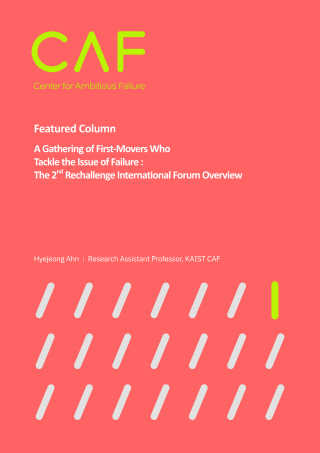 CAF InsightA Gathering of First-Movers Who Tackle the Issue of Failure : The 2nd Rechallenge International Forum Overview
CAF InsightA Gathering of First-Movers Who Tackle the Issue of Failure : The 2nd Rechallenge International Forum Overview2022-10-31
Hyejeong Ahn ┃ Research Assistant Professor, KAIST CAF
A Gathering of First-Movers Who Tackle the Issue of Failure : The 2nd Rechallenge International Forum Overview On October 13th, the 2nd Rechallenge International Forum was held at Cheongju Dongbu Changko. This event, which was inaugurated in 2021, is held annually on the International Day for Failure (October 13th) as part of the Fail Expo organized by the Ministry of the Interior and Safety (MOIS). This forum is unique in that members from the private, government, and academic sectors gather to share various stories and experiences about failure and retrying while also discussing opportunities to promote international soli- darity and cooperation. This year’s event was co-hosted by the Chungcheongbuk-do government and the KAIST Center for Ambitious Failure (CAF), a collaboration that helped to expand the scope of the forum and facilitate the sharing of more diverse cases with in-depth discussions.
Origin
Download -
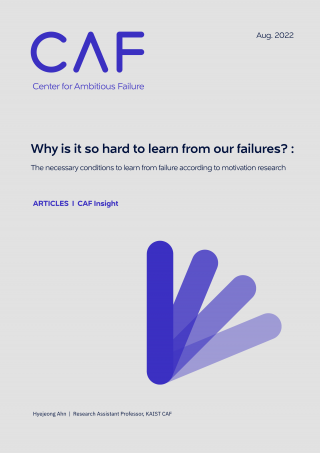 CAF InsightWhy is it so hard to learn from our failures?
CAF InsightWhy is it so hard to learn from our failures?2022-08-18
Hyejeong Ahn
Why is it so hard to learn from our failures? : The necessary conditions to learn from failure according to motivation research Today’s society is well aware of the fact that there are ‘lessons to be learned from failure.’ We often see successful individuals emphasize the importance of learn- ing from one’s failures. For example, Microsoft co-founder Bill Gates once said, “ it’s fine to celebrate success, but it is more important to heed the lessons of failure.” But let us take the time to think about this statement: how much do we really learn from our failures? The research paper featured in this report was published in 2019 by Professor Ayelet Fishbach from the University of Chicago Booth School of Business and Dr. Lauren Eskreis-Winkler, and it challenges our conventional wisdom of ‘learning from failure.’ Here, an experimental study was conducted to prove how the act of failure itself prevents an individual from focusing on the lessons that can be learned. This report will share and examine some of the key findings and implica- tions of the study.
Origin
Download -
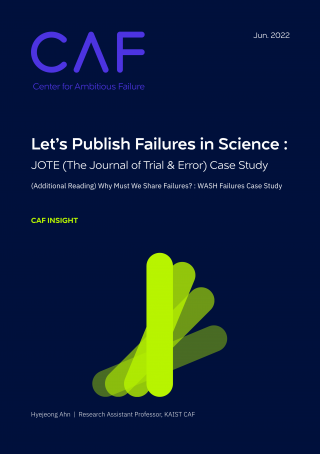 CAF InsightLet’s Publish Failures in Science : JOTE (The Journal of Trial & Error) Case Study
CAF InsightLet’s Publish Failures in Science : JOTE (The Journal of Trial & Error) Case Study2022-06-23
Hyejeong Ahn
Let’s Publish Failures in Science : JOTE (The Journal of Trial & Error) Case Study There is an academic journal that lives by the motto of ‘let’s publish failures in science.’ We are talking about the peer-reviewed open access journal based in the Netherlands called the Journal of Trial & Error (JOTE). This project is centered around the belief that ‘the way science is communicated affects the way science is done’ and is run by graduate students (master’s and doctoral degree candidates) studying in various fields, including history, neuroscience, philosophy, physics, artificial intelligence, toxicology, and more. This month’s issue of CAF Insight will explore the background behind the birth of JOTE, the journal’s purpose, and the activities pursued by the JOTE team. We will also discuss the implications of their efforts. (Additional Reading) Why Must We Share Failures? : WASH Failures Case Study “WASH Failures” is a project that highlights and discusses failures experienced by those working in international development cooperation projects related to water, sanitation, and hygiene. The aim of WASH Failures is to reduce the number of failed international development projects and encourage ‘better’ failures.
Origin
Download -
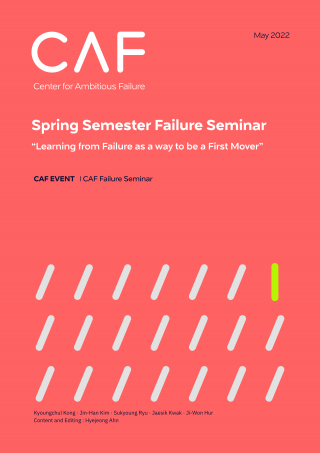 CAF Insight(Special Reports) Event Sketch - 2022 Spring Failure Seminar
CAF Insight(Special Reports) Event Sketch - 2022 Spring Failure Seminar2022-05-24
Speaker : Kyoungchul Kong · Jin-Han Kim · Sukyoung Ryu · Jaesik Kwak · Ji-Won Hur / Content and Editing : Hyejeong Ahn
On April 29th, the Center for Ambitious Failure (CAF) held its inaugural ‘Failure Seminar.’ Titled “Learning from Failure as a way to be a First Mover,” the Failure Seminar invited leaders from various fields to share their failure stories and experiences. The goal of the seminar was to give KAISTians new perspectives on failure and encourage them to be bold and adventurous in their endeavors. The following article summarizes the talks given by the five invited guest speak- ers who spoke at the first Failure Seminar. “Learning from Failure as a way to be a First Mover” Kyoungchul Kong ᅵ How do we Differentiate between Success and Failure? Jin-Han Kim ᅵ Exploring the Meaning of Failure through the Lens of Space Technology Development Sukyoung Ryu ᅵ Let a Little Sun Shine in Your Heart Jaesik Kwak ᅵ My Failures back when I was at KAIST Ji-Won Hur ᅵ The Various Forms and Meanings of Failure : the Psychology Perspective
Origin
Download

